I cracked a tooth this month, apparently from grinding my teeth. Having a sick family member and feeling hopeless, plus seeing the coming disaster, have taken a toll. Other than the tooth, I’m in the best shape of my life, except perhaps when I was kickboxing in my mid-thirties. (Mountain biking, my outlet for stress, has some good side effects.) I’ve been staying connected with friends, as we will need each other more than ever. Staying connected with nature, watching new and old beloved films. Some days I want to stay home, but if I didn’t go out, I would have missed photographing this Hairy Woodpecker, who I only saw after lingering at a beaver dam with my camera, hoping for a rodent to pop its head out. Joy is an act of resistance; the enemy wants you miserable. The birds want you to be happy.
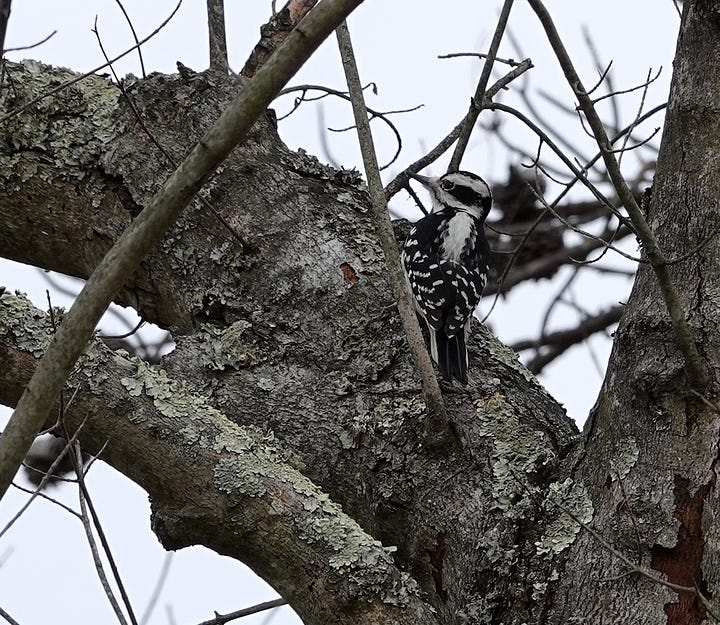
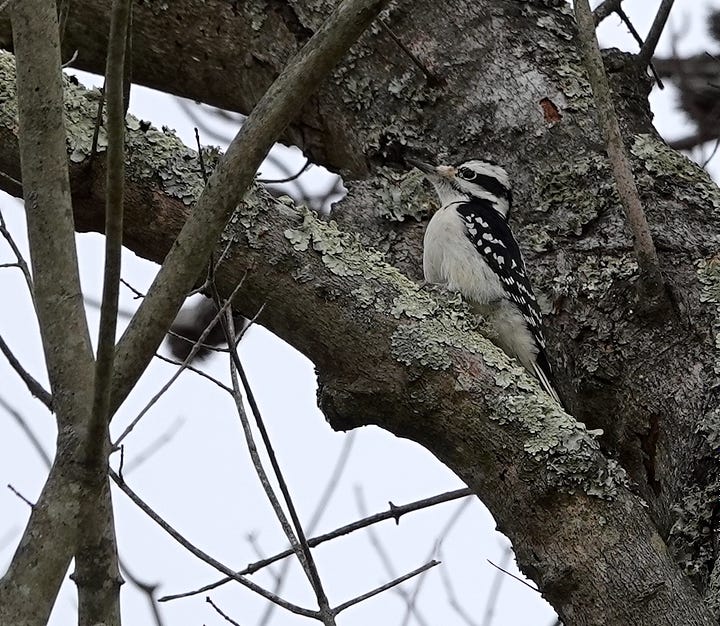
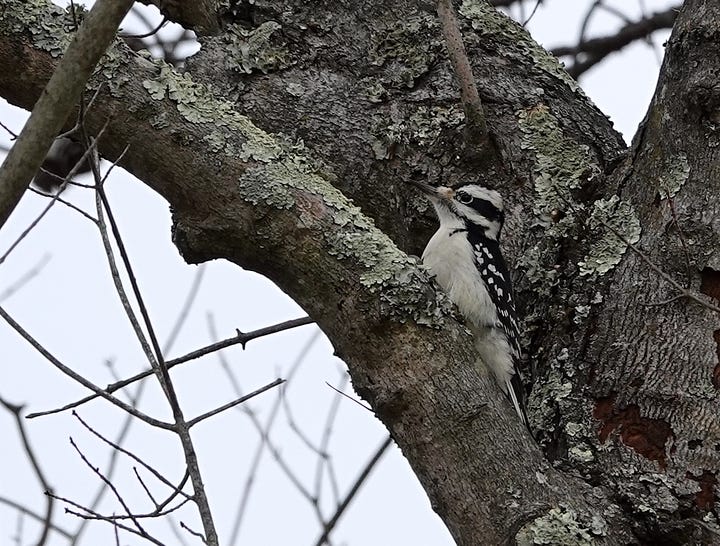
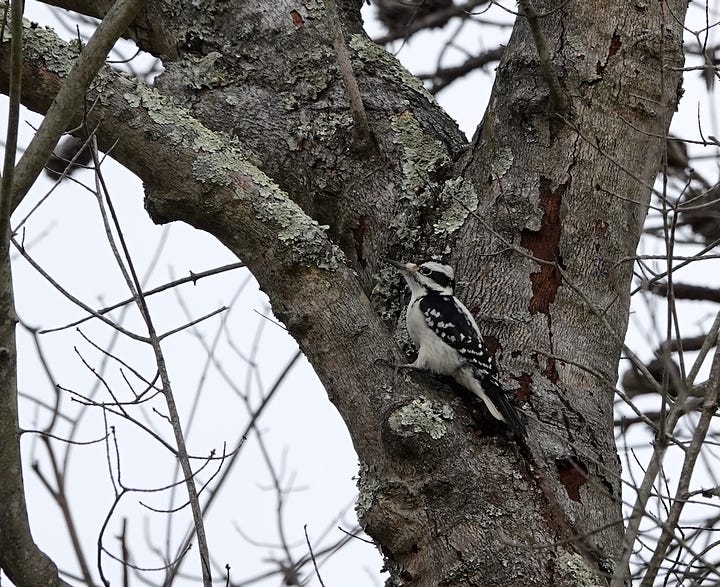
I was happy to see this one. I see a lot of Downy Woodpeckers, but this is the first time I’ve seen one of their larger cousins up close. According to James Freitas, I’ve accomplished a birding milestone by being able to tell these apart. (This one wasn’t difficult, it was bigger than any Downy I’ve ever seen, had a longer beak, and helpfully had hairy feathers over its legs for winter.)1
I’m currently reading If on a winter’s night a traveler by Italo Calvino, and Kindred: Neanderthal Life, Love, Death and Art by Rebecca Wragg Sykes. The first is entertaining meta-fiction, written in the second person, about you reading the book; due to a printing error, you embark on an adventure to find the next chapter, which leads you to reading chapters of other books, and it’s not as infuriating as it sounds; it’s a book about reading, and books, and has been good fun so far. This passage hit home:
“There's a boundary line: on one side are those who make books, on the other those who read them. I want to remain one of those who read them, so I take care always to remain on my side of the line. Otherwise, the unsullied pleasure of reading ends, or at least is transformed into something else, which is not what I want. This boundary line is tentative, it tends to get erased: the world of those who deal with books professionally is more and more crowded and tends to become one with the world of readers. Of course, readers are also growing more numerous, but it would seem that those who use books to produce other books are increasing more than those who just like to read books and nothing else. I know that if I cross that boundary, even as an exception, by chance, I risk being mixed up in this advancing tide; that's why I refuse to set foot inside a publishing house, even for a few minutes.”—Italo Calvino, If on a winter’s night a traveler
I’ve been on both sides of the line, and I’m trying to remain on the reader side. Not that I’ll never write again—I’m writing right now, aren’t I?—but clicking publish on the Substack page is about as involved with publishing as I prefer to get these days. Vyx Starts the Mythpocalypse was self-published, edited by professional editor, designed by designers, and so on. It was still quite a bit of work that was not writing or editing; just about what I feel like handling. More than that, and if feels like working the meat grinder at the sausage factory, and seeing too much.
Kindred is a fascinating read, but is also too much of a good thing; it goes into deep detail regarding what we’ve learned about our relatives (and for some of us, ancestors( the Neanderthals, but gets a bit dry. I’ve taken a primitive skills class and flaked chert, shale, and obsidian into tools, so the subject matter interests me, but I didn’t find the presentation very compelling. I mean, it’s banging two rocks together, but it’s also technological mastery of the environment, creating hand axes, razors, and small knives from raw materials, and learning to do so quickly enough that when good material is plentiful, you don’t even bother carrying your hand axe from site to site, because you’ll sit down and make one when you need it.
Some of this is because Sykes is fighting an uphill battle against our prejudices against our nearest relatives as dumb hulking brutes, with “neanderthal” even serving as an insult in Homo sapiens circles.2 We’re alive and they’re not; in the misreading of Darwin, that makes us the winners, the “more evolved,” a word pairing that makes no sense to evolutionary biologists. Darwin himself preferred “descent with modification” to evolution, but that word and its connotations of progress and competition won out.3 All sorts of theories as to why the Neanderthals went extinct exist; we killed them off, they were too dumb to make fire or have language, they specialized in hunting big animals and went extinct when they died out. It could be as simple as that the more robust Homo neanderthalis required more calories than Homo sapiens and in the long run, we overran their population and they died out, and interbred with us as their numbers dwindled. They live on in us, with many humans having Neanderthal DNA; the last full-blooded Neanderthal is believed to have died 50,000 years ago, an eye blink in the geological record. An extraterrestrial paleontologist may barely consider us Sapiens a different species.
There’s so little to find in the fossil record; bones and stones, mostly, and the occasional wooden object. We can fill in the rest with our imaginations, but scientists must rely on what can be proven. Sykes sticks to the science, but a lot can be inferred from the evidence, enough that I think it’s safe to believe that Neanderthals were a lot like us.
I had the pleasure of watching Harvey and Bedknobs and Broomsticks with good friends a week or so ago. Harvey is an old favorite of mine, with Jimmy Stewart’s good-natured drunkard Elwood P. Dowd and his titular pooka pal. We found ourselves more delighted by the antics of Josephine Hull, who plays his put-upon sister, and Victoria Horne, who plays his cooped-up niece. After all this time, I find myself wishing that Elwood was a little less pleasant, and a little more clever. Just a touch, mind you.
I wouldn’t change a thing about Angela Lansbury’s sorceress Eglantine in Bedknobs and Broomsticks, whose quest for an incantation leads her to an island populated by animated animals, and to defending England from a Nazi invasion. I regret not watching this one earlier; it’s good fun. The football match between the king lion and his subjects made the lion-King Richard of Robin Hood, the Disney film that came a few years later, seem wanting. This king would have been a more worthy adversary for the foxy Robin!
And keeping with the anti-fascism, I watched the oft-overlooked Studio Ghibli film Porco Rosso which is streaming on Max. I hadn’t seen this one in twenty years or more, and I regret putting it on the back burner. It’s as delightful as their other films. The “red pig” is Marco, a flying ace who has become a pig both over survivor’s guilt, and in protest over the creeping fascism in the country he defended in the Great War. Now he’s an outlaw and a bounty hunter, facing off against sky pirates and kidnappers. It’s good fun, beautifully animated. Sophia, in the picture with Marco, is his wiz mechanic sidekick.
Online reading:
I’m enjoying Charlie Hamilton’s memoir, which he is posting on Substack. He’s a wildlife photographer and more, and he’s telling us how he got there. He can write, too.
He’s only on chapter three, so you have time to catch up and read these as he’s posting them. So we can read along. I’ve written a serial novel online before (see: Vyx) and I may do so again. I’ve had werewolves and neolithic humans on the brain lately, but I’m not sure if either, or both, would be the subject. We’ll have to see what grabs me.
Alice Brock, the “real Alice” who Arlo Guthrie immortalized in his song “Alice’s Restaurant” has died at age 83. The community came together to help her pay for health issues a few years ago. She wasn’t fond of the fame and her portrayal in the movie, but she managed restaurants and fed people for years before moving to Provincetown and becoming a beloved member of the community. The former site of her restaurant is Theresa’s Cafe in Stockbridge, Massachusetts, which according to visitors, is most often closed. So you can’t get anything, much less anything you want. Maybe try the general stores nearby. If you want to read a good interview with Alice Brock, “Breaking Bread with Alice” at Berkshire Mag tells the real story.
Part of me is tagging James in the hopes that he’ll drop in and tell me, “That’s a Downy, ya idjit.”
Some say we’ve earned a second sapiens because we’re so smart. I disagree.
I learned this from Susie Dent’s wonderful word-a-day tome, Word Perfect. I think I bought mine in Iceland, as it’s not published in the United States, because publishers think Americans are too stupid to read it, and are probably correct.





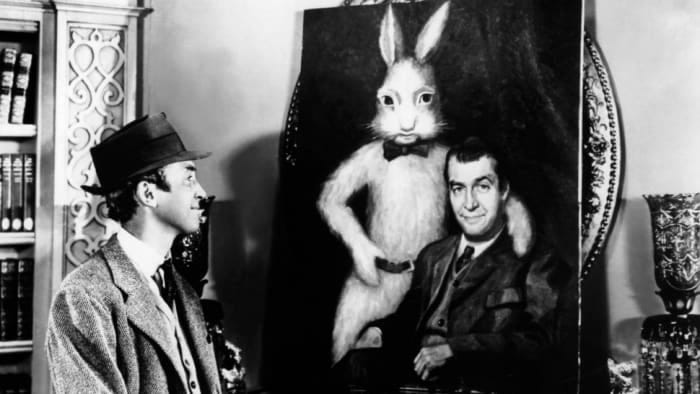
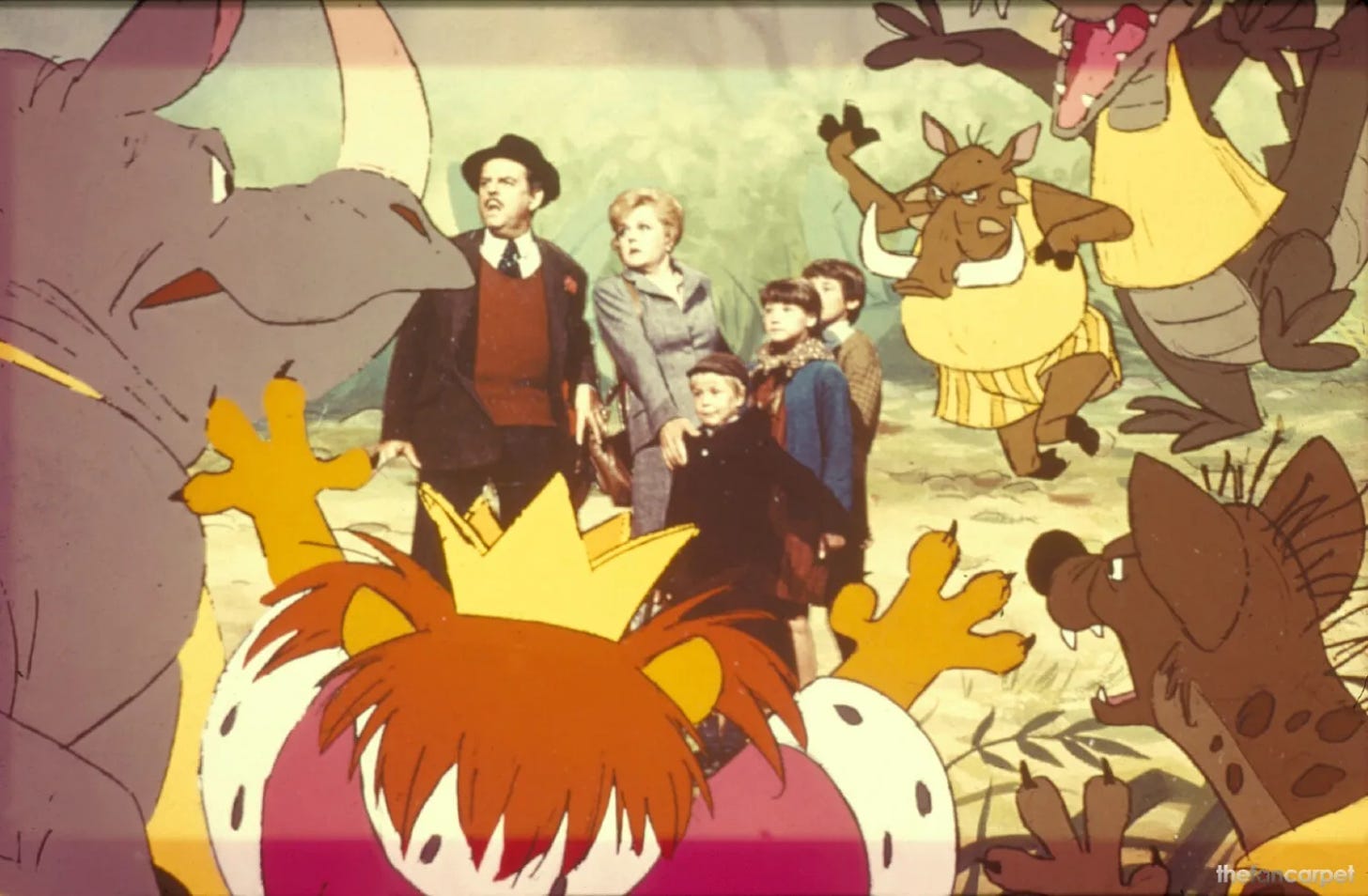
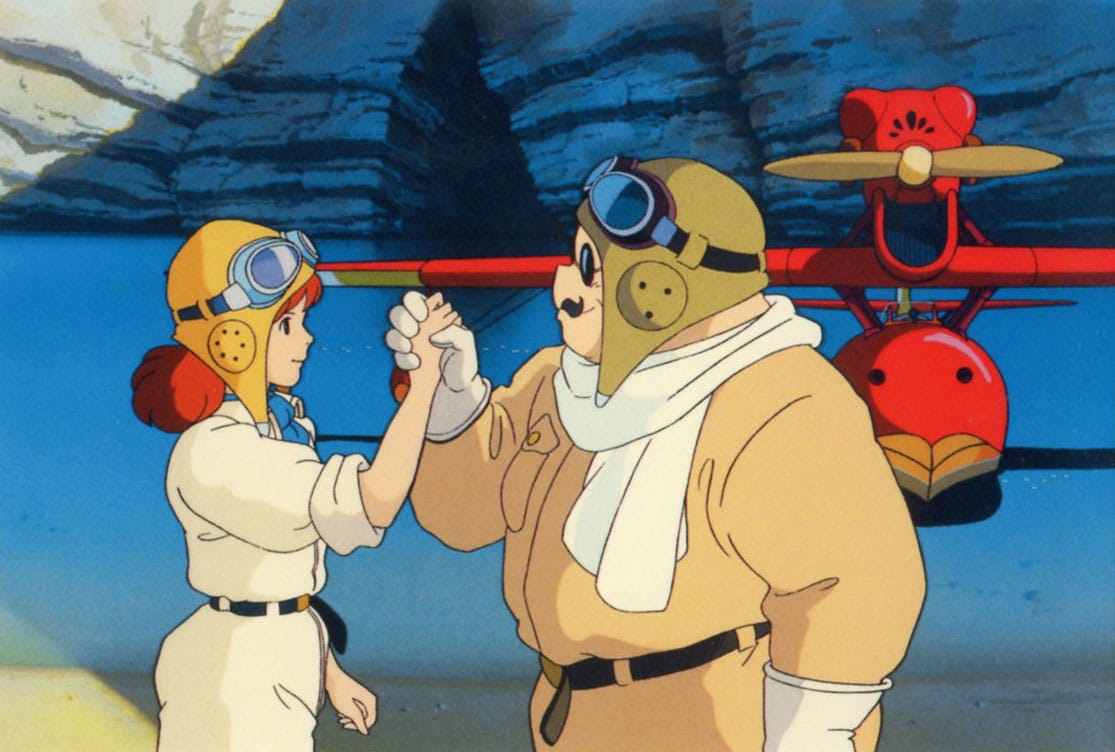

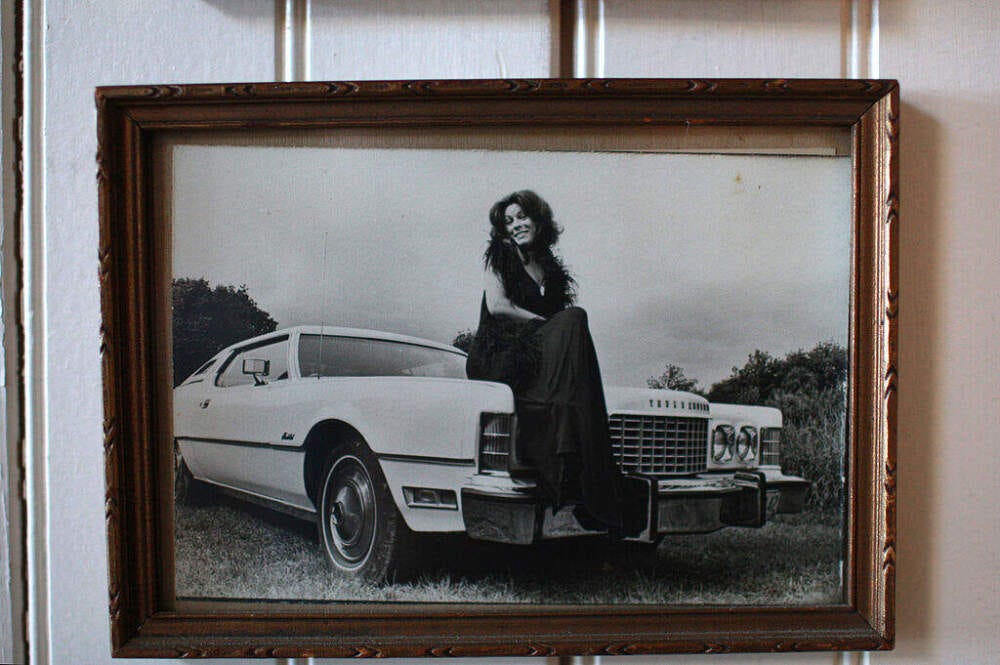
Great shots of that Hairy! Clearly captures the white outer tail feathers. And great line: "the enemy wants you miserable. The birds want you to be happy."
I minored in anthropology, so I totally agree with your frustrations about how "evolution" is (mis)understood in popular discourse...and don't even talk to me about that "23 & Me" scam 🤬
More pleasantly, I'm glad you're enjoying the Calvino. I found "Invisible Cities" gimmicky and pretentious, but I *LOVED* "The Baron in The Trees"